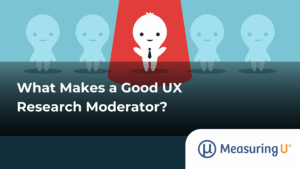
 Human research moderators aren’t going away.
Human research moderators aren’t going away.
Despite technological advancements, such as remote unmoderated testing (with and without thinking aloud) and AI moderators, a live researcher asking questions to a live person will always be needed. Technological innovations are less likely to render things obsolete than make them more specialized (like Internet > TV > Radio).
Interactions between researchers and participants often require a moderator with good interpersonal skills. The moderator must know how to read the verbal and nonverbal cues from the participant while also getting the needed information—a combination of being professional and being human.
But what makes a good research moderator? In this article, we explore the attributes that differentiate between inadequate and excellent moderators.
Understanding the Research Question(s)
Why are you moderating a session in the first place? Is the research team trying to uncover unmet needs in a market, understand why a new feature isn’t being used, or discover how people react to a new limitation? If you’ve designed the study, it’s a lot easier to know what the research questions are and the reasons behind them. But with teams (and certainly when you hire an external company like MeasuringU), understanding the “why?” behind the test goes a long way to modulating moderation style, such as when to probe and when to go off script (which we’ll cover next).
Tip: Put yourself in the head of the designer, product owner, or other stakeholder who will be on the receiving end of your findings. Do they just need to know broad themes, or do they need specific design guidance?
Understanding the Study Type
One of the first challenges of being a moderator in UX research is knowing what type of study you are working on. UX research includes several methods that employ a moderator, such as usability testing, interviews, contextual inquiries, and in rare cases, focus groups.
The studies will often dictate the style and how you adapt to participant input. A summative benchmark study focuses on tasks and metrics. In contrast, an in-depth interview about a new product idea usually requires a lot of probing and ad hoc pivoting based on what participants say.
But sometimes, even within a method, moderators need to modulate their style. For example, a moderator might be running a large in-person summative benchmark study, but the client still wants to know what’s driving low metrics. This means the research moderator has to find opportunities to probe.
An unstructured in-depth interview requires a different approach than a moderated summative evaluation. Here are common study types and how to adjust:
- Formative usability test: Focus on diagnosing problems and encouraging participants to think aloud. Avoid telling participants what to do.
- Summative usability test: Keep structure tight; prioritize metrics and consistency across sessions. Minimize interaction with participants.
- Exploratory interview: Probe deeply, follow new threads, and explore motivations.
- Follow-up interview (post-survey): Clarify unexpected quantitative findings or themes.
- Contextual inquiry: Observe real behavior first; question later.
Skilled moderators adjust their styles accordingly, probing only when appropriate in a metric-driven study, or stepping back during an observational one.
Modulating Style to Match the Goals and Study Type
About ten years ago, we identified a spectrum from babysitter to therapist that suggests how to modulate your style. Tedesco and Tranquada (2013) also identified a reasonable set of four styles: Friendly Face, Down to Business, Inquisitive Mind, and By the Book (summarized in Table 1):
| Style | Description | Good For | Possible Pitfalls |
|---|---|---|---|
| Friendly Face | Personable and encouraging | Participants who are timid, disengaged, or need reassurance | Being too casual risks going off-topic or influencing responses |
| Down to Business | Serious, professional, efficient | Structured studies; chatty or informal participants | Tone too harsh, intimidating, or condescending; suppresses openness |
| Inquisitive Mind | Curious and probing | Exploratory or discovery studies | Could derail study flow/time and lead to irrelevant tangents |
| By the Book | Scripted, methodical, precise | Studies needing consistency or technical accuracy | May miss spontaneous insights or intimidate participants to silence |
Table 1: Tedesco and Tranquada’s four moderation types.
Fundamental Moderation Skills
There are numerous skills across moderation types that act as indicators of a moderator’s expertise.
Establishes Rapport
A good moderator makes a participant feel comfortable, not to make friends, but to hopefully draw out honest feedback and opinions that provide insights. Simple empathy, small talk, and attentive body language go further than icebreaker questions alone. Rapport lets the participant know the moderator is listening and processing what they are saying.
Probes Appropriately
If we may loosely quote the late, great Kenny Rogers, a good moderator knows when to probe them and when to hold them (hopefully they don’t need to walk away or run). Proper probing is a skill that differentiates effective from ineffective moderation. It requires deeply understanding the research questions. In many cases, there may be a need to probe more than once to drill down to a root cause.
Probe 1: “Can you describe why you rated that task as difficult?”
Participant: “Because I had a hard time with the search bar.”
Probe 2: “What about the search bar was difficult?”
You may need to dig a little to understand the motivation. Some people refer to this as the five whys. In practice, you’re unlikely to have to probe five times (usually one to three will suffice). But on the other hand, you don’t want to belabor an issue if a participant isn’t providing valuable feedback.
Manages Time Well
Participants have scheduled time (usually 30 or 60 minutes), and stakeholders have scheduled time. A good moderator can modulate the probing (even skipping less important tasks) without “rushing” a participant. Sometimes parts of the study may need to be dropped to stay on time, a potentially tricky judgment that requires significant expertise to get right.
Uses Interpersonal Skills Effectively
While it’s easier to naturally have good interpersonal skills, they can still be learned and applied in the context of moderation. Tedesco and Tranquada identified five interpersonal qualities that are important for the moderator:
- Empathy—Recognizing and validating participant frustration (intervening if needed).
- Flexibility—Adapting to technical issues or unexpected answers.
- Creativity—Finding new ways to phrase or demonstrate questions.
- Sense of humor— Lightens tension or resets rapport appropriately.
- Authority—Not Stanley Milgram style, but staying on track and answering questions without being distracted.
Detects Misrepresentation (Detects BS)
Having participants misrepresent themselves is a waste of everyone’s time. While it seems improbable that someone would show up claiming to be an insurance agent or DevOps engineer but actually have no idea what those roles are, it unfortunately happens. With remote moderated sessions and AI, participants can easily fake their way past screeners (and even pre-screening interviews). In some cases, we’ve seen participants clearly reading from a prompt after each question (on phones or second computers). A good moderator should look for those signals, politely end the session, and notify the panel.
Uses Silence Strategically
Awkward silences may make conversations with friends and coworkers uncomfortable, but they can be a powerful tool for the inquisitive moderator who needs (and has the time) to uncover motivations.
Avoids Leading Questions
While a good discussion guide helps minimize biased questions, when you need to go off-script or follow up on what a participant says, a good moderator avoids putting words in participants’ mouths or suggesting answers. Don’t you agree?
Takes Notes Discreetly
Noting when something happened, what participants said, or what problem popped up all help to facilitate faster reports. Even with AI-generated transcripts and videos, having a quick reference leads to efficient reports. On the other hand, you don’t want note-taking to distract the participant (“why did she write that down?”) or slow down the session. Because keyboard clicking can be distracting for in-person and remote participants, handwriting is still preferred by some for quiet and quickness.
Manages Observers and Stakeholders
We have one-way mirrors in our labs in Denver, and our MUiQ platform supports hidden observers (a digital one-way mirror). Stakeholders commonly want more from participants and the moderator (all while the moderator is watching, listening, and taking notes). Juggling those demands takes serious multitasking skills.
Knows When to Move On
Asking the question, probing, then probing again, may sometimes yield few new insights. Or maybe a tech issue is worth troubleshooting, but only to a point. A good moderator knows when to move on (to stay on schedule or get to other areas of interest).
Knows When to Assist
In usability testing, moderators walk a fine line between observing and intervening. Moderators need to let participants experience the product naturally so real problems emerge. But sometimes, assistance is necessary.
An assist occurs when a moderator helps a participant move forward after getting stuck, ideally to preserve the flow of the session and uncover later issues. The key is to assist sparingly and deliberately: step in only when a participant truly can’t progress, when time is running short, or when continued actions along the current path could lead to uninteresting errors or data loss. Experienced moderators use assistance strategically and transparently, preserving test validity while ensuring productive sessions.
Goes Off Script When Needed
Sometimes it’s obvious when to probe an action or dig deeper into a comment, so those prompts can be put into a good discussion guide. But it’s hard to prescribe all those probes when tasks need to change or be dropped, or entirely new questions need to be asked. Understanding a research question (and the intent of the research) makes effectively going off script easier, but it’s never really easy.
How Do You Know Who’s a Good Moderator?
We know it when we see it, of course. But how do you objectively measure the quality of a moderator? Is it just as difficult as measuring the effectiveness of a leader? As far as we know, there is no objective rubric. Like the quality of a usability study test, it’s a lot easier to list factors that should be included (e.g., findings and quotes), but how do you objectively assess the quality of a moderator? We’ll cover that in an upcoming article.







